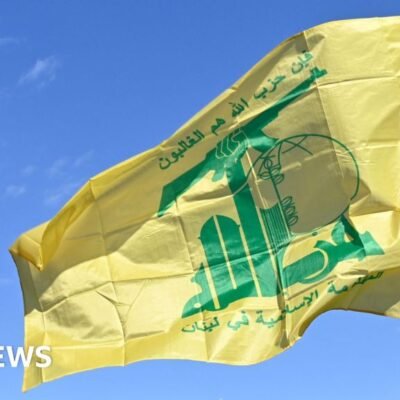Venezuelans are going to the polls in what has been described as the biggest challenge to the governing socialist PSUV party since it came to power 25 years ago.
Nicolás Maduro – who has been president since the death of his mentor, Hugo Chávez, in 2013 – will be running for a third consecutive term.
His main challenger is Edmundo González, a former diplomat who has the backing of a coalition of opposition parties.
Polls suggest Mr González has a wide lead over the incumbent, but as Mr Maduro’s 2018 re-election was widely dismissed as neither free nor fair, there are fears that the result of this election could be tampered with, should it not go Mr Maduro’s way.
Those fears have been compounded by the fact that Mr Maduro has told his supporters that he would win “by hook or by crook”.
But speaking to the BBC’s Newshour, Venezuela’s Attorney General, Tarek William Saab, maintained that the country’s electoral system was “fraud-proof” and called it “one of the best voting systems in the world”.
After casting his vote early in the capital, Caracas, on Sunday, Mr Maduro vowed to “make sure” the results announced by the National Electoral Council (CNE) would be respected.
The CNE – the body which organises the election and announces the official result – is dominated by government loyalists.
Its president, Elvis Amoroso, is a close personal ally of Mr Maduro.
“The word of the electoral referee is holy,” Mr Maduro added in remarks to journalists.
Mr González voted later in the day, also in Caracas, describing the occasion as a “day of reconciliation for all Venezuelans” and adding: “The time for change has come.”
He promised that if he won the election, he would do “everything possible” to woo back those who had fled the country in the wake of its economic collapse.
Economic hardship has taken its toll on the Venezuelan population, with more than 7.7 million people leaving in search of a better life – about a quarter of the population.
Venezuelans started to turn out before 06:00 local time (10:00 GMT), when voting was scheduled to begin, and huge queues have formed at polling stations around the country.
Tensions rose outside a polling station in Caracas, where queuing voters faced off and clashed as they waited for the doors to open, Reuters news agency said.
Polls are scheduled to close at 18:00 local time (22:00 GMT) and results should begin to emerge within hours.
There are only a very limited number of independent election observers in the country to monitor the poll – four from the United Nations and a small technical team from the US-based Carter Center.
An invitation to European Union observers to be present was revoked by the head of the electoral authority, who is a close ally of Mr Maduro.
The ex-President of Argentina, Alberto Fernández, was also uninvited after he said that the Maduro government should accept a possible defeat at the polls.
Mr Maduro has, however, welcomed hundreds of guests from countries allied with his government, who he says will “accompany” the vote.
The opposition, meanwhile, has mobilised thousands of people to act as witnesses at individual ballot stations.
Despite the many hurdles the opposition has faced – including constant harassment and the arrest of more than 100 people linked to its campaign since the start of the year – the opposition has been sounding an optimistic note.
It argues that the opinion polls have given its candidate such a big lead over President Maduro that it will not be possible for him to “steal the election”.
The government has dismissed the opinion polls quoted by the opposition, maintaining it is their candidate who is in the lead.
Mr Maduro himself has resorted to stark language in the run-up to the polls, warning of a “bloodbath” should he be defeated.
That statement earned him a rare rebuke from Brazil’s left-wing leader Luiz Inácio Lula da Silva, who said that Mr Maduro should learn “that if you win, you stay in power, but if you lose, you go”.
Mr Maduro has used the image of a fighting cockerel as a symbol for his campaign and has struck a combative note.
“We have triumphed over a thousand storms. They could not defeat us, nor will they ever be able to,” he said at his closing rally in a reference to some of the challenges he has seen off in his 11 years in power.
Following his re-election in 2018, which was widely dismissed as neither free not fair, he thwarted an attempt by opposition leader Juan Guaidó to depose him by declaring himself the rightful president.
While Mr Guaidó was backed by more than 50 countries, including the US and the EU, Mr Maduro could count on the loyalty of Venezuelan security forces.
In the end, Mr Guaidó’s parallel government withered, with Mr Maduro using it to portray himself as the “defender of Venezuelan sovereignty”, a point he drove home at his closing rally.
“On Sunday, we will prove it to the fascists, to imperialism. We will shout, ‘Long live Venezuela, my beloved homeland,'” he said.
But despite this fighting talk, many Maduro critics feel that this election – the first in over a decade in which most of the opposition has united behind one candidate and is not boycotting the poll – could be their best shot at removing him from office.
They have overcome many hurdles on the way to the polls, not least the fact that their chosen candidate, María Corina Machado, was banned from running for office.
Those who want to see a change of government have united behind her replacement, 74-year-old Edmundo González, in record time.
Cuba, China, Iran and Russia – all of them close allies of the Maduro administration – will also be keeping a close watch, as a win for Mr González would most probably see a realignment of Venezuela away from them and towards the US.
Mr González also told a rally of tens of thousands of people that it was “time to re-establish democracy” – a reference to the fact that in its 25 years in power, the governing PSUV party has gained control not just of the executive, but also of the legislative arm and to a large extent, the judiciary.
Voting is electronic and the result is expected to be announced by the CNE on the same night, perhaps as early as 20:00 local time (01:00 BST Monday).
Whoever wins is due to be sworn into office on 10 January 2025.





